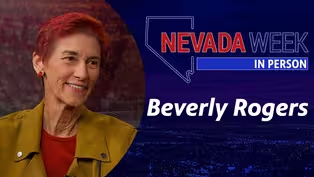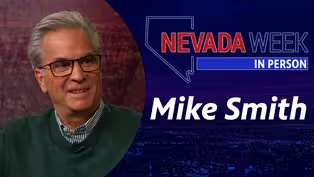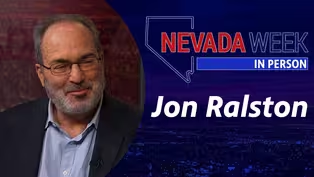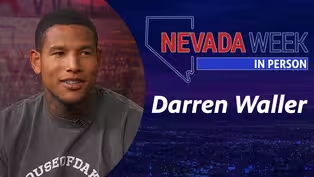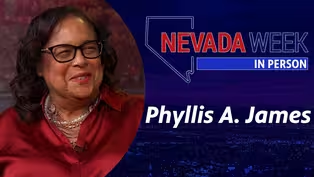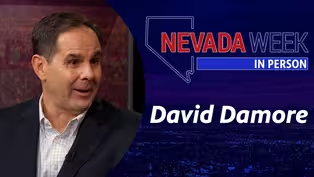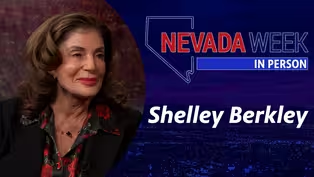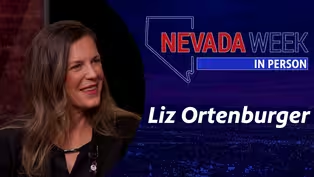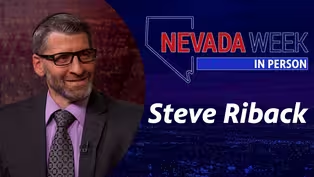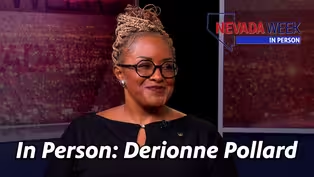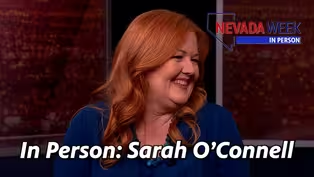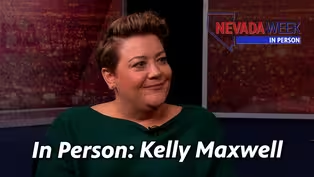
Nevada Week In Person | Erick Harper
Season 1 Episode 15 | 14mVideo has Closed Captions
A one-on-one interview with new UNLV Athletic Director Erick Harper.
A one-on-one interview with the new athletic director for UNLV, Erick Harper.
Problems playing video? | Closed Captioning Feedback
Problems playing video? | Closed Captioning Feedback
Nevada Week In Person is a local public television program presented by Vegas PBS

Nevada Week In Person | Erick Harper
Season 1 Episode 15 | 14mVideo has Closed Captions
A one-on-one interview with the new athletic director for UNLV, Erick Harper.
Problems playing video? | Closed Captioning Feedback
How to Watch Nevada Week In Person
Nevada Week In Person is available to stream on pbs.org and the free PBS App, available on iPhone, Apple TV, Android TV, Android smartphones, Amazon Fire TV, Amazon Fire Tablet, Roku, Samsung Smart TV, and Vizio.
Providing Support for PBS.org
Learn Moreabout PBS online sponsorshipMore from This Collection
Nevada Week In Person goes beyond the roundtable discussion of Nevada Week with guests for a more casual conversation about their personal passions, new projects and compelling stories that are overlooked in the flurry of the news cycle.
Nevada Week In Person | Beverly Rogers
Video has Closed Captions
One-on-one interview with Rogers Foundation chair Beverly Rogers. (14m)
Nevada Week In Person | Mike Smith
Video has Closed Captions
One-on-one interview with Las Vegas Sun political cartoonist Mike Smith. (14m)
Nevada Week In Person | Jon Ralston
Video has Closed Captions
One-on-one interview with The Nevada Independent CEO Jon Ralston. (14m)
Nevada Week In Person | Darren Waller
Video has Closed Captions
One-on-one interview with Las Vegas Raider tight end Darren Waller. (14m)
Nevada Week In Person | Phyllis A. James
Video has Closed Captions
One-on-one interview Phyllis A. James. (14m)
Nevada Week In Person | David Damore
Video has Closed Captions
One-on-one interview with Chair of the Department of Political Science at UNLV David Damor (14m)
Nevada Week In Person | Shelley Berkley
Video has Closed Captions
One-on-one interview Senior Vice President for Touro University Shelley Berkley. (14m)
Nevada Week In Person | Liz Ortenburger
Video has Closed Captions
One-on-one interview with SafeNest CEO Liz Ortenburger. (14m)
Nevada Week In Person | Steve Riback
Video has Closed Captions
One-on-one interview with Las Vegas Metro Police Lieutenant Steve Riback. (14m)
Nevada Week In Person | DeRionne Pollard
Video has Closed Captions
One-on-one interview Nevada State College President DeRionne Pollard. (14m)
Nevada Week In Person | Sarah O’Connell
Video has Closed Captions
One-on-one interview with Director of Eat More Art LLC Sarah O’Connell. (14m)
Nevada Week In Person | Kelly Maxwell
Video has Closed Captions
One-on-one interview with Baby’s Bounty Executive Director Kelly Maxwell. (14m)
Providing Support for PBS.org
Learn Moreabout PBS online sponsorshipHe's the 14th full-time athletics director in UNLV history.
We talk with new UNLV AD Erick Harper this week on Nevada Week In Person.
♪♪♪ Support for Nevada Week In Person is provided by Senator William H. Hernstadt and additional supporting sponsors.
(Amber Renee Dixon) Following a national search in the fall, UNLV officially named Erick Harper its new athletics director in January.
He'd already been working in that role for six months as interim AD after Desiree Reed-Francois' departure in August and brings 30 years of university athletics administration experience to the position.
Erick Harper, thank you so much for joining us.
-Thank you, Amber.
-Tell me about the transition.
When did you really feel it?
Did it happen when they removed the "interim" from your title or when you took over the interim position six months ago?
(Erick Harper) You know, the entire time, even when I was named interim back in August, August 16 was technically my first day-- -You remember that day.
-But you know, considering I wanted the job, and I wanted the job in the worst way in one respect, I didn't look at it as interim.
If I was going to work and get the job done, I had to work as if I was permanent not as interim, making decisions as permanent not as interim.
So to really get to your question, it really hit-- I couldn't sleep one night of course, as it happens in this profession, but I was watching the movie Bad Boys II.
It was probably 2:30 in the morning, 3:00 in the morning, I couldn't sleep.
And there's a part in the movie where Martin Lawrence, when his sister in the movie, Gabrielle Union, is on the plane with the drug lord going to Cuba, he says, it just got real.
That's when I was like oh, my goodness, this is real.
But it was awesome.
-Was it a specific event that made you think this got real?
-Not necessarily a specific event.
It's just that I knew at that point, but no one else knew but my wife and I that I was going to be named permanent, and watching that movie, it just made me-- because that episode of it, it just got real, but he used some other words in there too that I can't use on TV.
But that's when I-- you know, I started talking to my family in Texas and those particular things and it really, you know, made it feel wonderful, and I was just completely humbled and honored to be considered and selected.
-Previously, you'd been there nine years as senior associate athletics director for development.
So you started in 2012 under Jim Livengood, and then you had two different athletic directors after him.
At what point did you want the job?
Was it all the way back to 2013 when Tina Kunzer-Murphy started?
-Okay, I always wanted to be an AD after a few years in the profession.
I actually started working for Steve Miller, who was executive director of the Agassi Foundation here in Las Vegas, so that was when I finally realized I wanted to be an AD.
When I wanted this job it was after a few years here, and I realized that, you know, I met my wife here in Las Vegas and my kids are here.
My wife, we have two kids.
And that's when I started to say you know what, and I told my wife, I would never move our daughter once she hit the ninth grade.
I wouldn't do that to her.
So I stayed committed to that, and then as we continued to move through-- you know what this is?
This is the spot, and I knew Desiree had higher aspirations to go to a Power Five, and she she earned that opportunity to be at a Power Five.
And I was like you know what?
Here's my chance so let's take a run at it.
-Do you have those aspirations or are you waiting until your daughter... -Absolutely not.
I am here through and through for UNLV.
I feel awesome about being here, awesome about having the opportunity, and I thank Jim Livengood for that opportunity.
I'm committed to UNLV through and through, no ifs, ands or buts about it.
My wife received her undergrad at UNLV, she earned her master's at UNLV, and she's currently working on her PhD at UNLV as well, so we're a little bit-- we're pretty vested in UNLV.
-I'll say, and on the way in here, you told me your wife dressed you today.
I said you got some style.
-Absolutely.
She is absolutely phenomenal in that, and she puts different things-- -"Love you Dad" is on the inside.
-Yes.
That's my father, Frank Harper.
We put embroidery on the inside.
The one I wore the other night had Erick loves Patrice-- or "Patrice loves Erick."
But, you know, that's who we are as a family.
Yes, that's my wife.
That's who we are as a family, and again it's important that, you know, that I have a brand that is significant for UNLV and positive and great.
-Your dad, what kind of influence did he have on you?
-Holy cow.
He's born and raised in New Orleans, Louisiana.
-Is that where you're from?
-I'm from Texas, a small town in Texas called Denison.
-It's not on your bio where you're from.
-My dad met my mother in Texas.
He was in the Air Force at Perrin Air Force Base in Denison, Texas.
And he always challenged me, and one of the things that was interesting was I was a Cowboys fan.
So no disrespect, I love the Raiders, but I was a Cowboys fan and my dad always rooted for every team that played the Cowboys to draw out the competitive nature, to draw out the competitive nature in me, and he's a major influence.
He passed away in '88 when I was in college, but that was-- he influenced me in a way that there's nothing I can't achieve if I put my mind to it.
And I know that's a cliche but at the same time, that's exactly what I've done.
-He made you believe in it.
Did he get to see you play defensive back at Kansas State?
-He did.
That was a lot of fun, and interestingly, I was very fortunate to play for Bill Snyder in my senior year and actually Bob Stoops as well.
So two Hall of Fame coaches, and very appreciative of the opportunity.
And what Bill Snyder instilled in us is getting better every day, but also making sure that you understand that you're cared about.
Stay committed, stay strong, stay tough, believe in what you do, be consistent in what you do.
And Coach Stoops was one of those-- he was a young coach at the time, just come over to Kansas State from Kent State, and we had an absolutely dreadful record, but we weren't terrible players.
So Coach Snyder said all right.
We're going to-- you don't have a chance to win in the fourth quarter.
That's where we're at right now.
We're going to give you a chance to win in the fourth quarter.
We only won one game in Coach Snyder's first year but we saw the progress, and Coach Bob Stoops was as tough as it gets but as loving and caring as it gets as well.
I still keep in touch with Bob Stoops now, and when I was appointed permanent athletic director, Coach Snyder wrote me a handwritten note to say congratulations.
-That example you used of not being able to win in the fourth quarter, would you apply that to UNLV football currently?
They're 2 and 16 over two seasons under Coach Marcus Arroyo.
-You know, we've had our struggles.
Whether it's first quarter, second quarter, third quarter, fourth quarter, we've had our opportunities in the fourth quarter, but it's something I think Coach Arroyo is moving towards, to learn how to win in the fourth quarter, to learn how to put that last drive together or learn how to put that-- whether it's the score, kick a field goal to win the game, tie the game, go to OT, but also at the same time to hold on to the lead that you have.
And you know, a lot of times they talk about the four-minute offense, and I believe Coach Arroyo is on the right track with that.
I believe he's on the right track to getting our program to a consistent level of winning.
He just signed another really good recruiting class, and a lot of those will be coming in and playing right away.
So I think he has an opportunity to do some really great things.
-How do you approach that situation, do you sit down with him prior to him entering his third season?
Do you give any kind of ultimatum like I want you to get this many wins this season?
-No.
I mean, you don't want to put ultimatums out there.
It's one of those you support your coach, you support what he's doing, you support the vision that he has, you support his assistant coaches, and you support those student athletes.
I'm not going to put a number out there.
That's a level of pressure.
He's a Division I football coach.
He understands the pressures of what you have to do, and winning is-- you know, some people say it's a by-product, but let's be real honest.
Winning is important and graduation is important.
And his student athletes over his three semesters, four semesters here, he has put together-- three semesters-- he has put together an academic track where they broke the record as a team each semester GPA wise, his cumulative GPA, and that's the most important part at the end of the day.
We all want to win, that's part of it, but graduating our student athletes is the most important part.
-Wow.
Because in your quote on your bio, you do say, "Staff who are driven to win championships "graduate our student athletes."
So you say win championships first.
I was going to ask you about that.
But you do agree that graduating students is probably more important.
-Yes, absolutely.
And winning championships, you know, that's part of our motto and our core values as well, and winning championships-- when our student athletes walk across the stage at the end of their college careers and get their diploma, I want them to have a class ring and multiple championship rings.
So if we can achieve that, we've done our job as administrators and as coaches.
-Switching topics, you are the first Black athletics director at UNLV.
What kind of emotions come with that?
-You know, it comes with a big responsibility, a significant responsibility because if I fail, it hurts a lot of people because they may not have the opportunity because the Black athletic director failed.
But I don't look at fail.
I'm not going to fail; I'm not a failure.
I have a fear of failure, but I am not going to fail at this position, at this job.
But being the first, you know, I try to look at it as just being one of many athletic directors, but at the same time, there is a significant responsibility for me to do it at a high level, do it the right way, without compromising my values.
-Sounds like some pressure.
-A little bit, you know, but at the end of the day, my dad prepared me for pressure.
Bill Snyder prepared me for pressure.
My mother prepared me for pressure.
She was probably harder on me than my dad, and my brothers and sisters.
You know, they've all prepared me for this opportunity, and I'm excited about it and ready to roll with it.
-One of eight children.
How did that impact you and maybe your leadership style?
-Actually, I'm one of nine.
My youngest brother passed away in 2012 actually, right before I came to UNLV.
But being one of nine, don't be late to the dinner table.
There's a good shot that you won't get a chance to eat.
But at the same time, the support they have given me over the years, you know, from peewee football to Kansas State, throughout my athletic career at Kansas State as well as University of Arizona and also here at UNLV, they've been fully supportive and just extremely proud to be a part of that family.
-Speaking of growing up, it is Black History Month.
I wonder what did that month mean to you growing up, and what do you want it to mean for your two children?
How do you approach this month?
-You know, I look at it this way.
I celebrate Black history every day.
You know, it's not just the month of February.
I'm just fortunate enough to be born in the month of February, and one of my daughters was born in the month of February as well.
My mother was born in February and a lot of family members in February, my niece as well, but it's a month that is recognized and celebrated.
Today, February 3, 1920, the Negro League was founded and that's significant in the sense that there's so many Black baseball players that are in the Hall of Fame that can look back to this day as to why they had the opportunity to play Major League Baseball, and it's extremely important to me in the month.
But I talk to my daughters about it, you know, as much as we can without having just the sole focus of our days just being about Black history.
-Erick Harper, thank you so much for your time.
UNLV's newest athletic director, we wish you the best of luck, much success.
To see more of our series Nevada Week In Person, go to our website, vegaspbs.org/inperson and tune in on Sunday at 5:30 p.m. and Tuesday at 7:30 p.m. for this week's Nevada Week.
♪♪♪

- News and Public Affairs

Top journalists deliver compelling original analysis of the hour's headlines.

- News and Public Affairs

FRONTLINE is investigative journalism that questions, explains and changes our world.












Support for PBS provided by:
Nevada Week In Person is a local public television program presented by Vegas PBS
